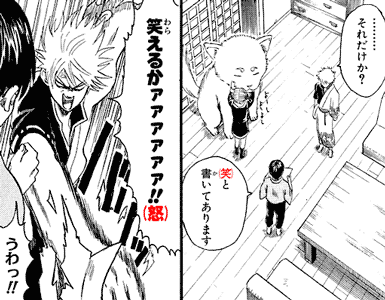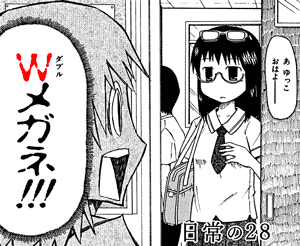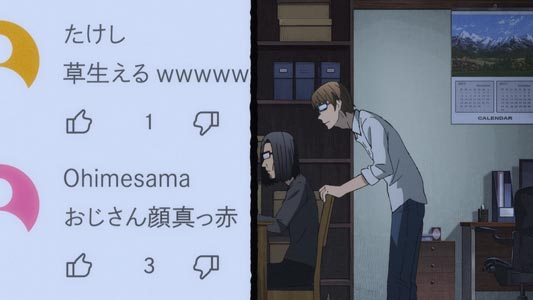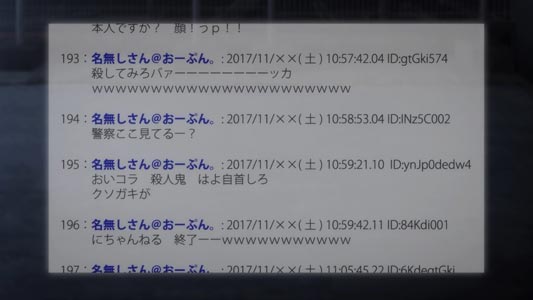In Japanese, a sequence of w's written at the end of a sentence in an internet comment (w, ww, www, wwww, and so on) is a slang like "lol," "lmao," or "rofl" in English. In manga and anime, it's particularly used by internet troll characters, and otaku, leaving snarky comments and starting flame wars.
Anime: Uncle from Another World, Isekai Ojisan 異世界おじさん (Episode 1)
Anime: Inuyashiki いぬやしき (Episode 6)
Pronunciation
The w's may be pronounced as wara わら(コトカワ:w), e.g. wwww being wara-wara-wara-wara わらわらわらわら. Since they signify laughing, some people may pronounce them as hahahaha ハハハハ instead, or simply not read them out loud at all.
Normally, however, a single w would be pronounced daburyuu ダブリュー, its katakanization.
See also: English Alphabet Letters in Katakana.
Meaning
The w at the end of a sentence in Japanese stands for warai 笑い, "laugh," the noun form of the verb warau 笑う, "to laugh." It's used like "lol (laugh out loud)" in English, except far more frequently.
The reason it stands for the noun "laugh" and not a progressive like "[I] am laughing," waratte-iru 笑っている, is because in Japanese internet speak nouns that refer to emotions can be written between parentheses at the end of a sentence, so w stands for (笑).
- Context: characters from Gintama do odd jobs. Someone left a monstrously huge dog outside their home, with a letter that said "please take care of my pet."
- ......... sore dake ka?
・・・・・・・・・それだけか?
.........only that? (that's all that is written?) - kakko-warai to kaite-arimasu
(笑)と書いてあります
(laugh) is [also] written. (literally.) - waraeru kaaaaaaa!! kakko ikari kakko-toji
笑えるかァァァァァァ!!(怒)
[How] can [I] laugh!! (anger)- waraeru - potential verb from warau 笑う, "to laugh."
- See also: tsukkomi ツッコミ.
- Although the manga makes no distinction, in the anime adaptation (10th episode), Shinpachi 新八 pronounces (笑) as kakko warai, without kakko-toji 括弧閉じ, "close [round] bracket," while Gintoki 銀時 pronounces (怒) as kakko ikari kakko-toji.
- uwa'!!
うわっ!!
Note: a W prefix at the start of a word or phrase means "double" instead.
- Context: Minakami Mai 水上麻衣 greets Aioi Yuuko 相生祐子.
- a, Yuuko, ohayoo
あ ゆっこおはよー
Ah, Yuuko, good morning. - W-megane!!!
Wメガネ!!!
Double glasses!!!
For making a W-shape with your legs, see W-sitting.
vs. (笑)
There's a difference between w and (笑), even though both translate to "lol." The nuance is that the (笑) emoji can be perceived like a gentle, fun laugh, while w, a Gamer™ slang, is typically perceived as a mocking laugh, full of snide or cynicism.(kaidohh:「w」と「笑」の違いは)
An analogy:
- (笑)
:D - w
lol
It's thought that w is used by internet-savvy users who hang around in online forums, while (笑) might look like some newbie who doesn't even know to build their own computer or something like that. Specially considering the trend in texting and net-speak of abbreviating everything.(意味まとめ:w)
- (笑)
- (笑
- (w
- w
In Japan, the most known "online forum" in the sense it even comes up sometimes in anime would be 2ch (2channel), which the well-known western 4chan is based on. Although ch stands for "channel," chan is sometimes interpreted as the diminutive honorific suffix ~chan ~ちゃん instead.
What This 2ch refers to in anime is a bit of a puzzle. Basically, 2ch's domain used to be 2ch.net, but its administration forgot to pay for the domain name, and the registrar made it up for grabs, so someone else bought the domain name, and now 2ch.net redirects to 5ch.net (5channel), which is a very similar imageboard forum, and after that 2channel reopened as 2ch.sc.(wikipedia:2channel, citing The Japan Times)
w vs. ww vs. www vs. wwww
There's practically no difference between a sentence that ends in one w or multiple w's, except for the fact that having an exaggerated logically means an exaggerated amount of laughs had been had.
- w
lol - wwww
lol rofl lmao xD
In some cases there's a ridiculous number of these.
Grass
If you place a bunch of w's side by side horizontally, like wwwwwwww, it kind of looks like "grass," kusa 草, doesn't it? What does this have to do with anything? Well, kusa 草 is another slang for "lol" in Japanese net-speak, which derives from these w's.
- X de kusa ga haeru
〇〇で草が生える
Because of X, grass grows. (literally.)
Because of X, wwww.
Because of X, I laughed.
Origin
The origin of the wwww at end of the sentences is said to be the MMORPG Diablo, developed by Blizzard.(chiebukuro:Wの語源は何でしょう)
The w has nothing to do with the content of the game Diablo itself, rather, its origin lies in the fact that the game, released in 1997 by a western developer, lacked support for Japanese text.
It wasn't possible to type 笑う in the game chat, but the game did have Japanese players nevertheless. To communicate, these players would type in romaji instead—that is, they couldn't type "笑う," but they could type the transliteration "warau."
From there, warau was abbreviated to w, and with the release of the 2000 sequel Diablo II, popular in Japan, this usage of w spread to outside the game, to forums around the internet.
Examples of Usage
For reference, some examples of w's being used in anime.
Comments in Online Forums
The most obvious usage of wwww is in comments posted in online forums in response to whatever content the thread is about.
- Context: an uncle from another world reads comments on his Youtube video.
- Takeshi
たけし - kusa-haeru wwwww
草生えるwwwww
Grass grows wwwww. - Ohimesama
お姫様
Princess. - ojisan kao makka
おじさん顔真っ赤
[Old man]''s face is red.
Anonymous Imageboards
One notable type of online forum are anonymous imageboards, or keijiban 掲示板, "bulletin boards," with BBS being a related acronym for "Bulletin Board System," the software or website running the board.
Given anonymity to protect them from any consequence, many users won't think twice before instantly mocking everything they can and everyone they can to feel superior and justified, regardless of whether they're right or not, which ultimately allows them to spam w's more than otherwise.
- na-nashi-san
名無しさん
Nameless-san. Mr. Nameless.
An anonymous user in a board (most users). Administrators, for example, may be named.
This term is equivalent to "anon" in English.
These forums are called "imageboards" because they optionally allow users to post an image in threads, as opposed to being only text. Nowadays with Twitter, etc., that sounds like a given, but I guess long ago when internet speeds were much slower it was a game-changer for users talking about anime and other image-focused stuff.
A well-known English anonymous imageboard is 4chan, whose logo has 4 leaves, and is based on the Japanese imageboard futaba channel, 双葉ちゃんねる, "two-leaf channel," also known as 2chan, whose logo is a potted plant with 2 leaves, and which is itself based on another Japanese board called 2ch, also known as 2channel. While the "ch" and "chan" stand for "channel" in Japanese, it's sometimes interpreted in the west as the diminutive honorific suffix ~chan ~ちゃん instead.
In anonymous boards, an user posts a "thread," sure スレ, and other users may post "responses," resu レス.
Users browse thread on the board's front page (or index), with the threads that have most recent responses displayed first, while those with no activity may be buried under many pages of other threads. Also, boards may routinely automatically delete threads with no activity, or that are simply old.
- age
上げ
"Rising." "Lifting." (noun form of ageru 上げる.)
This is the equivalent of "bump" in English.
Users have to post SOMETHING in a thread to keep it alive and on the front page to attract new posters, and it just became universally agreed that when you're posting just to do this, you post "bump" in English, or age in Japanese.
Response in a thread displayed linearly in chronological order. There's no ordering by upvotes or likes, nor are there tree-like nested comments, the sort you'd have in websites like Reddit.
Instead, all responses are assigned a number (e.g. 104, 4929, 99999, etc.), so it's possible to refer to what another user said by citing the response number (e.g. by typing a greater sign ">" like >104, >4929, >99999).
Some boards have a separate counter per thread (so you have response 4 in two different threads), while others have a board-wide counter so one thread can refer to a response in another thread.
- getto
ゲット
GET.- The number a post gets assigned is almost random, but can be vaguely guessed. An user posts "GET (some number)" to bet that the post will get assigned the number, e.g. "GET 1000," and if your post is the thousandth post in the board, you got it right, but if someone else posted something before you, your post number would be 1001, and you'd have failed to GET it.
- See also: kiriban キリ番.
- Context: a well-known murderer tells an anonymous bulletin board that he's gonna kill everyone in that thread.
- hon'nin desu ka? kao! up!!
本人ですか?顔!うp!!
Are [you] [the murderer himself]? [Your] face! Upload it!
- hon'nin - the person themselves, as opposed to someone speaking in their behalf.
- nanashi-san atto oopun
名無しさん@おーぷん
Anon @ open.- Open probably refers to open 2 channel, おーぷん2ちゃんねる, a bulletin board based on 2ch.
- The incrementing numbers 193, 194, 195, 197, 197, and so on at the left side of each response is the identifier used to cite what a previous user posted.
- The 2017/11/×× is the date. Japan uses a year-month-day date format. The ×× where the day would go is a placeholder used in fiction in places where a specific name or number isn't necessary. See ○, ×, and △ for details.
- tsuchi 土, "dirt," inside parentheses next to the date refers to the weekday: doyoubi 土曜日, "saturday."
- koroshite-miru baaaaaaaaaakka
殺してみるバァーーーーーーーーッカ
Try killing [me], stuuuuuuuuuuuuuuuupid. - wwwwwwwwwwwwwwwwwwwwww
wwwwwwwwwwwwwwwwwwwwww
*laughs anonymously.* - keisatsu koko miteruu?
警察ここ見てるー?
Police, are [you] seeing [this]?- koko ここ, "here," as in "this thread."
- miteru - contraction of mite-iru 見ている.
- oi kora, satsujinki, hayo jishu shiro
おいコラ 殺人鬼 はよ自首しろ
Hey, murderer, go surrender yourself already.- hayo - synonymous with hayaku 早く, "quickly."
- kuso-gaki ga
クソガキが
[You brat]. - nichan'neru shuuryouuu wwwwwwwwwww
にちゃんねる 終了ーーwwwwwwwwwww
2channel is finisheeed, lolololololololololol.
Scrolling Horizontally
Sometimes you may see a bunch of w's scrolling horizontally from right to left in an anime episode, and sometimes even appearing to in manga. This is a reference to comments posted on a video hosted on Niconico, a video-sharing website that is like a Japanese Youtube.
When viewing a video in the website, you may optionally configure the video player to show users' comments, so they start showing up from the right going to the left at the exact moment the user who commented wrote that comment when they were watching the video.
This means that if something funny happens in the video, in the next moment users will start typing comments laughing at the funny thing that happened, and when the video is replayed you'll have a wall of text depicting the audience's reaction right after the funny thing happened.
The same system also exists for livestreams.
Anime: Nyan Koi! にゃんこい! (Episode 2)
- Context: a manba gyaru sees the main character, who has cat allergy, talking to cats, a stream of Niconico-style comments appear out of nowhere, likely representing her thoughts.
- It's worth noting that her first person pronoun is atashi あたし, and one of the comments uses a different first person pronoun, indicating that the comments weren't written by herself.
- The text speed is obviously too fast to read without pausing. It makes sense all comments are displayed for the same length of time, equally, which means longer comments move sideways faster than shorter ones.
- neko ni norowareta-n-daro www
猫に呪われたんだろwww
[He] was cursed by cats, [I bet], lol.
- neko
ねこ
Cat. - zawazawa......
ざわざわ・・・・・・
*sound effect for an anxious situation, likely a parody to Kaiji.* - wwwwwwwwwwwwwwwwwwww
- kita~~~~!!!!
キターーーー(゚∀゚)ーーーー!!!!
[It] came!!!! (literally.)
It's here!!!!- Phrase used when something awaited finally happens. Often used like this, as a meme, around the internet, sometimes even including this exact kaomoji 顔文字..
- {neko-zuki na} ore ni wa {tamaranai} shichu www, kawatte-kure wwww
猫好きな俺にはたまらないシチュwww代わってくれwwww
For me [who] {likes cats} [it] is an {irresistible} situation www, please switch with [me] wwww.- ~zuki - suki 好き affected by rendaku 連濁.
- tamaranai - something you can't get enough of, favorite, irresistible, negative form of tamaru たまる, "to stock up," "to fill up."
- Σ(゚Д゚")
A shocked kaomoji, used when something is sugoi すごい for example. - {itsuka yaru} to omotta w
いつかやると思ったw
[I] thought that {[he] would do [it] sometime}. (literally.)
I had a feeling he would do something like this one day.- itsuka - itsu いつ, "when," interrogative pronoun followed by the ka か particle.
- cho' w oma www
ちょっwおまwww
- Kousaka w neko to ww ohanashi tte...
高坂w猫とwwお話しって・・・
Kousaka w, talking ww with cats [is]... - {arerugii da} nante itteru kedo, hontou wa neko ga dai-suki na no ne w
アレルギーだなんて言ってるけど、本当は猫が大好きなのねw
[He] [keeps] saying {[he] is allergic}, but the truth is [he] loves cats, [doesn't he]? lol
References
- Wの語源は何でしょう - detail.chiebukuro.yahoo.co.jp, accessed 2022-07-12.
- 「w」と「笑」の違いは、相手への敬意にある - kaidohh.hatenablog.com, accessed 2022-07-12.
- w - kotowaka.com, accessed 2022-07-13.
- wの意味と読み方とは - imimatome.com, accessed 2022-07-13.
- 2channel - en.wikipedia.org, accessed 2022-07-13.






It is that thing I often see on Bilibili. Now I know its origin. *nods
ReplyDelete"Bilibili is a video sharing website themed around anime, manga, and game fandom based in China, where users can submit, view, and add commentary subtitles on videos" -wiki
www has also been intergrated in Chinese discussion boards too, smhw, espeacially anime centric ones.
Btw, love your borogu. The articles are very informative and interesting for me who wants to learn Japanese because of manga and games. (Superficial I know...but who cares:p) *continue lurking
I'm Japanese and often use WARA online,
ReplyDeletebut I didn't go into the detailed origins of it.
I'm glad to know that.